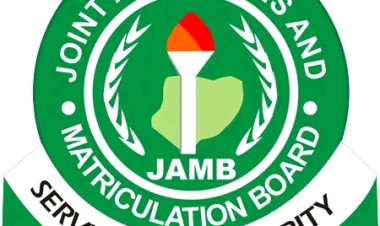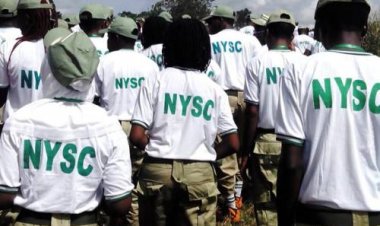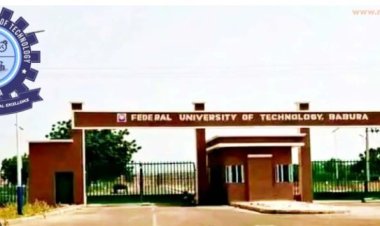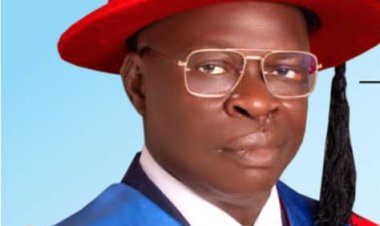DELSU DVC, Professor Anomohanran, Advocates Efficient Management of Water Resources
The need for efficient management of water resources for domestic, agricultural and industrial purposes and for the survival of mankind and other living creatures came under focus today, Thursday, February, 29, 2024 at the Delta State University, Abraka (DELSU).

The need for efficient management of water resources for domestic, agricultural and industrial purposes and for the survival of mankind and other living creatures came under focus today, Thursday, February, 29, 2024 at the Delta State University, Abraka (DELSU), where the Deputy Vice-Chancellor (Academic), Professor Ochuko Anomohanran presented the 104th in the series of inaugural lectures of the University.
Read also: DELSU VC, Professor Egwunyenga, Urges Fresh Doctors to be Courageous, Humble
Speaking under the topic “Striking the Earth Rock with Moses’ Staff: The Perspective of a Geophysicist”, Professor Anomohanran made a robust case for the efficient management of water resources to enhance human survival and progress.

Fully appreciative of the fact that most of his listeners at Hall 750 A, Site III, are not Physicists, the inaugural lecturer took time to explain some critical terms in the work to include earth, Moses staff and geophysics. The earth, according to him, “is a solid object from its look, and the most common knowledge or understanding of it stems from the excavation of the earth to a few meters below the surface”. He described Moses staff as “a rod or walking stick used by Moses. It was used to produce water from a rock, transformed into a snake and back, and used in the parting of the red sea”.

The top Physicist described Geophysics as “the study of Earth and its environment in space. The emphasis is the exploration of the earth’s interior, using physical properties measured at or above the earth’s surface, together with mathematical models to predict those properties”. Professor Anomohanran explained the unique property of water as always being in motion above and below the earth’s surface (natural water cycle), adding that, “this occurs through five processes namely: evaporation, condensation, precipitation, surface runoff and infiltration”.
A notable Geophysicist, Professor Anomohanran employed biblical allusion to good use when he recalled the experience of Israelites in Exodus (17:1-7), when the people arrived Rephidem. Tired, frustrated and thirsty, the people complained bitterly to Moses, their leader. In one of the miracles recorded in the Bible, God instructed Moses to strike the rock of Horeb with the staff in his hand, which he did, and water gushed out of the rock.
Describing God as the No.1 Geophysicist, Professor Anomohanran concluded that God must have applied a great force on Moses’s staff, “such that when Moses struck the rock, the force created an opening by cracking the rock from the surface down to the water table”.

Given the importance of water, Professor Anomohanran, who has held many high profile positions in the University, explained that “in today’s world, many communities obtained the vital resource from rivers, lakes, carnals, ice caps, glaciers or rain collection through reservoirs. One other source of water lies directly beneath most towns and communities, which is referred to as groundwater”.
According to the result-oriented Deputy Vice-Chancellor, “groundwater is the water that lies beneath the ground surface, filling the pore spaces between grains in bodies of sediment and clastic sedimentary rocks and filling cracks and crevices in all types of rocks”.
According to the former Director of the University Examination Centre, “the subsurface zone in which all rocks are filled with water is known as the saturated zone. The upper surface of the saturated zone is the water table. This water is accessed through hand-dug wells or boreholes drilled through the subsurface into the saturation zone. The upper surface of the saturated zone is the water table”.
Read also: DELSU Inaugurates Scholarship Scheme with 69 Beneficiaries
He noted that most Nigerians preferred using groundwater in their everyday needs because of its relatively low cost and the ease with which it is accessed, adding that it was also not easily affected by natural conditions, or otherwise, in some cases, it was sufficiently secluded from contaminants percolating from the surface as the earth layers acted as the natural filter to stop the contamination.

He said that the use of groundwater included domestic and drinking purposes, industrial use, irrigation, livestock watering, power generation, waste disposal, recreation and the maintenance of the ecosystem. He however, regretted that adequate water supply had been hampered by the increase in population, pollution and the climate. “The lack of sufficient quantity of groundwater can affect the economy, energy generation, human health, transformation, national security, agriculture, the ecosystem and recreation”, he warned. “This is why we must protect this water when it is available for human use and the ecosystem’s health”. Professor Anomohanran remarked that “although nature had given water to humans, in abundance, the ease or access to this resource in reasonable quantity and quality had proven to be a major challenge worldwide.
“With more ions in the water, the water’s electrical conductivity (EC) increases. By measuring the water’s electrical conductivity, we can indirectly determine its TDS (total dissolved solids) concentration. At a TDS concentration, water becomes saline (containing sodium chloride). Water with a TDS above 500 mg/l is not recommended for use as drinking water (WHO, 1996; NIS, 2015) Water with a TDS above 1,500 to 2,600 mg/l is generally considered problematic for irrigation use on crops with low or medium salt tolerance”.

As a frontline Geophysicist, Professor Anomohanran has made immense contributions to knowledge in his area in his home state of Delta, especially in Delta Central Senatorial District. According to him, “about groundwater, I have worked in communities and towns across the length and breadth of Delta state. Here in Abraka, I have used the geoelectric, geophysical logging and pumping tests to investigate the lithological strata of the subsurface and the aquifer properties of the groundwater.
“The study revealed that groundwater can be sourced between a depth of 3.15 and 45.9m for good quality water. The water is reliable at this depth with the total dissolved solids and electrical conductivity within the World Health Organization (WHO) permissible limit”.
Speaking at the well attended event, Vice-Chancellor, Professor Andy Egwunyenga, congratulated the inaugural lecturer on the high quality of his lecture describing him as a workaholic. He remarked that it was an epochal event and a moment of fulfilment for the lecturer.
Professor Egwunyenga who is giving DELSU an enlightened and committed leadership, noted that Professor Anomohanran’s inaugural lecture was the second by a principal officer of the University since over four years when he mounted the saddle of leadership at DELSU, the first being Professor Stephen Uwaifo, the former University Librarian who delivered the 85th in the series of inaugural lectures of the University on June 17, 2021.
In further commending Professor Anomohanran, the top University administrator described the inaugural lecturer as an “academic machine and energetic Geophysicist who is dedicated and focused”.

In decorating the hardworking Physicist with the University Distinguished Medal, the Professor of Parasitology and Public Health noted that God was the greatest scientist, adding that Moses’ staff and the resultant water from the rock were great miracles of all times. He, therefore, admitted Professor Anomohanran as a senior Professor of the University, praising him for his prodigious contributions to knowledge. He urged the audience to consider how they could harness the groundwater potentials to meet their drinking water needs.
Read also: DELSU Issues Notice to Students on CBT Exam for Short Term Certificate Programme
The occasion attracted very distinguished personalities including His Royal Majesty, Lucky Ochuko Ararile, Awaeke I of Umiaghwa, Abraka Kingdom, a retired Air Vice-Marshal; His Royal Majesty, Akpomeyoma Majoroh, Ojeta II, the Ovie of Oruarivie, Abraka Kingdom, who was represented by a senior palace Chief; senior academics including the Provost of Oleh Campus, Professor Elo Ibagere; the Registrar, Mrs. Rufina Ufiofio, the University Librarian, Dr. (Mrs) Josephine Onawhakpor; the Bursar, Mrs. Otimeyin Ekakitie-Omajuwa, represented by Mr. Franklin Itiveh, among others.




